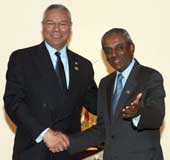 |
| Colin Powell |
London, Sept. 1 (Reuters): US secretary of state Colin Powell said today that Washington wanted the “first step” towards solving the Iraq crisis to be the return of weapons inspectors to assess President Saddam Hussein’s arms capability.
Powell’s comments appeared to contradict the stance taken by US vice-president Dick Cheney, who said last week there was no point in sending inspectors back into Iraq but instead hammered home his case for pre-emptive military action.
Speaking in an interview recorded for BBC television, Powell said US President George W. Bush wanted to see the inspectors, who were forced out in December 1998, go back in.
“The President has been clear that he believes weapons inspectors should return,” Powell said in an extract of the BBC interview. The full interview is due to be broadcast next Sunday, September 8.
“Iraq has been in violation of these many UN resolutions for most of the last 11 or so years,” he said.
“So, as a first step, let’s see what the inspectors find, send them back in.”
Powell also said he understood that the international community needed more information about the threat posed by Saddam Hussein before it decide on what should be done.
“I think that the world has to be presented with the information, with the intelligence that is available,” he said.
“A debate is needed within the international community so that everybody can make a judgment about this.”
Powell’s comments underlined an emerging split between so-called hawks in the American administration such as Cheney and defence secretary Donald Rumsfeld who back military action against Baghdad, and more restrained voices in Britain who say getting weapons inspectors back in should be the priority.
Powell appeared to side with Britain’s foreign secretary Jack Straw, who last week insisted that weapons inspections were the priority of London’s policy on Iraq, not the “regime change” in Baghdad called for by Bush and Cheney.
British Prime Minister Tony Blair is trying to tread a path between the two — insisted that some action must be taken against Iraq, but refusing to specify what that should be.
Blair said yesterday that the world could not stand by and allow Iraq to develop weapons of mass destruction in “flagrant breach” of UN resolutions.
He said “doing nothing about Iraq’s breach of these UN resolutions is not an option” but insisted no decisions had been made about what action should be taken.
Opposition Conservative leader Iain Duncan Smith warned Blair against prevaricating on the issue of Iraq and accused him of allowing the debate on support for US-led military action to “drift”.
Writing in the London Sunday Times, Duncan Smith called for pre-emptive action against Iraq, saying Britain was at high risk from future missile attacks by Saddam Hussein.
“We can choose to act pre-emptively or we can prevaricate. Intervening in Iraq is not about doing the right thing in the US, it is about doing the right thing for Britain,” he said.
Powell speculation
Dousing speculation about his running for the country’s top job, Powell has hinted that whether or not President Bush gets re-elected, he would quit at the end of the present term.
“He will have done a yeoman’s job of contributing over the four years. But that’s enough,” a media report said quoting Powell’s top aide.
“I did what my heart told me to do. I got (Bush) here and set him up. I did the best I could do,” Powell was quoted as telling the aide by the news magazine Time in its upcoming issue.
Those who dream of a Powell presidential candidacy in 2005, said Time, have little cause for hope.










